

Wanna fix gut, adrenal, and sleep problems? You gotta start here... Living in modern society has it’s benefits.

While our ancestors and fellow modern humans living in 3rd world conditions have to deal with a range of deadly pathogens, our modern healthcare system is well-equipped to deal with things of that nature. While both tend to die of these infections, we stick around because we have methods of successfully treating them. While our healthcare system is fantastic at dealing with issues like this, that doesn’t mean we don’t have 1st world problems. More than 50% of the population has at least 1 chronic disease, and treating these diseases represents more than 80% of our healthcare costs. To say we are ill-equipped at dealing with chronic disease is an understatement.
It’s universally agreed upon that most of the things that drive our chronic disease burden are driven by lifestyle. But what about chronic issues that fall outside the scope of those diseases? As such, people with these issues are often dismissed entirely. Image source Image source. Magnesium is essential for circadian rhythms - Hack your gut. Magnesium is an important mineral to our health.

More than 600 enzymatic reactions in the body require it. Furthermore, the molecule our cells use for energy, ATP, is inactive until magnesium binds to it to form Mg-ATP. A paper in 2016 found that bacteria, plants, and animals have a circadian rhythm of intracellular magnesium. Clock genes control channels in cells; some bring magnesium in to the cell, others cause it to leave it. Perhaps the most interesting thing about this study is that it works both ways. Magnesium and ATP Adenosine triphosphate, or ATP, functions as the cellular energy currency in our cells. Circadian rhythms: More than blocking blue light at night - Hack your gut. A common approach for people experiencing sleep problems is blocking blue light at night.

Blue light is a signal that helps set our circadian rhythm by synchronizing our master clock to the environment. But many require further help. In fact, most do. That’s because circadian rhythms are about a lot more than just blocking blue light at night. How Artificial Wrecks Sleep & How Blue Light Can Help. “A good laugh and a long sleep are the best cures in the doctor’s book.” – Irish Proverb The evidence for the health benefits of adequate, restful sleep is overwhelming. Decades of research has shown that sleeping between 7 and 9 hours per night can relieve stress, reduce the risk of many chronic diseases, improve memory and cognitive function, and may even help with weight loss. (1) As many of us know by now, getting adequate, high-quality sleep is one of the most important, yet under-appreciated steps you can take to improve your overall health and well-being. Yet for all we know about the benefits of sleep, there are millions of Americans who are still suffering from disordered sleep and insomnia.
Could using electronics at night ruin your sleep and increase your risk of death and disease? Check out this article to find out. Circadian Rhythm. 14 Hacks in Keeping a Circadian Rhythm + Zeitgebers. 32+ Zeitgebers (Biological Cues) And How To Enhance Your Circadian Rhythm. Food intake is a zeitgeber (talks to the brain via ghrelin, leptin, glucose, insulin, etc) and depending on the time of day you eat, food can affects different pathways and metabolic funcitons.
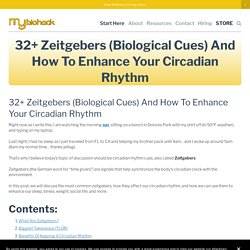
R For example, mice that were delayed in their eating patterns for 2 days had changes in their liver circadian rhythmicity. R Food intake can also cause disruption of circadian rhythms, body temperature, and immune functions via Lipopolysaccharide (LPS)-endotoxins. R R R Fasting may combat some detrimental effects of mismatched feeding times, especially for those with dysbiosis. Why Am I So Tired All the Time? It’s Your Circadian Rhythm!
Circadian Rhythm: What It Is & How to Fix Your Internal Clock. Top 25 Methods For Better Sleep and Circadian Rhythm Entrainment. Circadian Rhythm Confusion and Resetting Our Internal Clocks. Our bodies are run by a circadian rhythm, an internal clock consisting of 24-hour cycles.
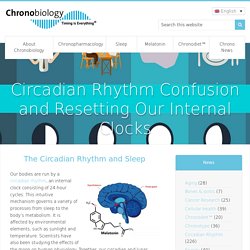
This intuitive mechanism governs a variety of processes from sleep to the body’s metabolism. It is affected by environmental elements, such as sunlight and temperature. Scientists have also been studying the effects of the moon on human physiology. How to Improve Your Sleep With Morning Sunlight. Struggling with poor sleep?
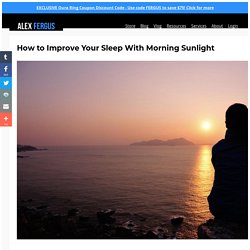
Wired & alert at night yet groggy and lethargic when your alarm clock screams out in the morning? You’ve probably tried all sorts of things to fix this – supplements, sleep tracking devices, maybe even modifying your sleep environment. But have you ever considered that your daily environment could be setting the stage for how well you sleep at night? In fact, there is a very critical time every day that can make or break whether you will sleep well later that night. That time is in the morning - the first few hours after you wake (and ideally around sun rise). Chrononutrition, Chronobiology & Circadian Rhythm. Chronotherapy: Why Resetting Your Inner Clock Can Improve Your Life - Selfhacked. Regulating Circadian Rhythm (and why that's important) What It Means to Keep to a Circadian Rhythm. The New Science of Sleep-Wake Cycles (and How to Improve Yours!) One of my favorite topics to research and to write about is how sleep (or lack thereof) affects our bodies.
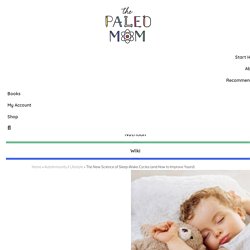
And, the more I learn about the necessity of life, the more I’m convinced that getting enough of it is as big a deal, if not moreso, than how we eat. Effect Of Sleep Deprivation And Meal Timing On Insulin Sensitivity. Thursday, November 19, 2015 As we continue learning more about the complexity of appetite and energy balance, sleep and circadian rhythm are emerging as important variables.
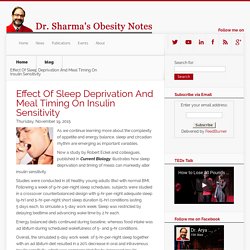
Now a study by Robert Eckel and colleagues, published in Current Biology, illustrates how sleep deprivation and timing of meals can markedly alter insulin sensitivity. Studies were conducted in 16 healthy young adults (8w) with normal BMI. Fat Tissue Has Receptors for Sunlight and They Affect Fat Metabolism (Guest, Professor Peter Light) You probably already know that ambient light regulates circadian rhythms by interacting with light-sensitive neurons in the eye.
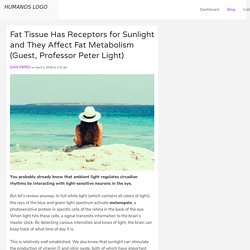
But let’s review anyway: In full white light (which contains all colors of light), the rays of the blue and green light spectrum activate melanopsin, a photosensitive protein in specific cells of the retina in the back of the eye. When light hits these cells, a signal transmits information to the brain’s master clock. By detecting various intensities and tones of light, the brain can keep track of what time of day it is. This is relatively well established. How light exposure affects health – an interview of Dan by Dr. Joseph Mercola. On January 19, 2014 at 10:47 am Today, my video interview with Dr.
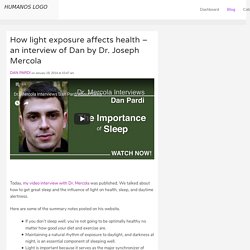
Mercola was published. We talked about how to get great sleep and the influence of light on health, sleep, and daytime alertness. Here are some of the summary notes posted on his website. SNR #73: Borge Fagerli – Circadian Rhythms & Nutrient Timing. Soon we will see ‘chrono-’ attached to every form of medicine. It was just a regular shipment of golden hamsters from the breeding colonies, except for one male animal. While all the other hamsters aligned on the shelf in the lab of Michael Menaker, then professor of biology at the University of Oregon, showed a regular 24-hour activity rhythm, the mutant and his descendants lived by a quicker daily pulse.
The 20-hour hamsters didn’t live long under 24-hour cycles of light and dark – they died of a kind of perpetual jetlag. But put them in a 20-hour light cycle, and they were fine. In some meaningful sense, the animals’ home was not Earth. They were aliens whose home planet was somewhere out among the stars, rotating every 20 hours. All life on a rotating planet is ruled by circadian rhythms. Plenty of good science has been done, but the applications of this research, especially in medicine, are just beginning.
The first circadian clocks originated more than 2 billion years ago, during the Great Oxidation Event. Subscribe to Aeon’s Newsletter. Intermittent Fasting as a Therapy for Hypothyroidism. A week's worth of camping synchs internal clock to sunrise and sunset. Seth Roberts and Circadian Therapy. Faces Therapy. Beyond Standing Desks: Portable Outdoor Workstations. The Benefits of Near Infrared Light.